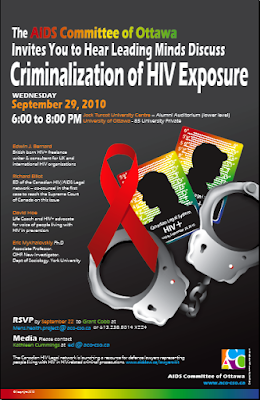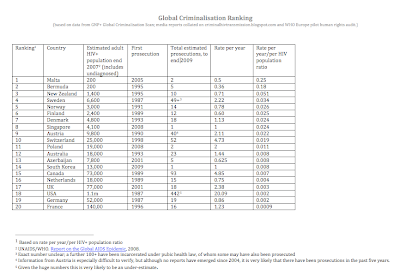A new project announced yesterday by UNAIDS will “further investigate current scientific, medical, legal and human rights aspects of the criminalization of HIV transmission. This project aims to ensure that the application, if any, of criminal law to HIV transmission or exposure is appropriately circumscribed by the latest and most relevant scientific evidence and legal principles so as to guarantee justice and protection of public health.”
I’m honoured to be working as a consultant on this project, and although I can’t currently reveal any more details than in the UNAIDS article (full text below), suffice to say it is hoped that this project will make a huge difference to the way that lawmakers, law enforcement and the criminal courts treat people with HIV accused of non-disclosure, alleged exposure and non-intentional transmission.
The UNAIDS article begins by noting some positive developments previously highlighted on my blog, including Denmark’s suspension of its HIV-specific law. It’s not too late to sign on to the civil society letter asking the Danish Government to not to simply rework the law, but to abolish it altogether by avoiding singling out HIV. So far, well over 100 NGOs from around the world have signed the letter.
The article also mentions recent developments in Norway. In fact, the UNAIDS project is funded by the Government of Norway, which has set up its own independent commission to inform the ongoing revision of Section 155 of the Penal Code, which criminalises the wilful or negligent infection or exposure to communicable disease that is hazardous to public health—a law that has only been used to prosecute people who are alleged to have exposed others, to, and/or transmitted, HIV. It will present its findings by October 2012.
As well as highlighting some very positive recent developments in the United States – the National AIDS Strategy’s calls for HIV-specific criminal statutes that “are consistent with current knowledge of HIV transmission and support public health approaches” and the recent endorsement of these calls by the National Alliance of State and Territorial AIDS Directors (NASTAD) – it also focuses on three countries in Africa.
Positive developments have also been reported in Africa. In the past year, at least three countries—Guinea, Togo and Senegal—have revised their existing HIV-related legislation or adopted new legislation that restrict the use of the criminal law to exceptional cases of intentional transmission of HIV.
I’d like to add a few more countries to the “positive development” list.
Canada
Last September, I spoke at two meetings, in Ottawa and Toronto, that officially launched the Ontario Working Group on Criminal Law and HIV Exposure’s Campaign for Prosecutorial Guidelines for HIV Non-disclosure.
The Campaign’s rationale is as follows
We believe that the use of criminal law in cases of HIV non-disclosure must be compatible with broader scientific, medical, public health, and community efforts to prevent the spread of HIV and to provide care treatment and support to people living with HIV. While criminal prosecutions may be warranted in some circumstances, we view the current expansive use of criminal law with concern.
We therefore call on Ontario’s Attorney General to immediately undertake a process to develop guidelines for criminal prosecutors in cases involving allegations of non-disclosure of HIV status.
Guidelines are needed to ensure that HIV-related criminal complaints are handled in a fair and non-discriminatory manner. The guidelines must ensure that decisions to investigate and prosecute such cases are informed by a complete and accurate understanding of current medical and scientific research about HIV and take into account the social contexts of living with HIV.
We call on Ontario’s Attorney General to ensure that people living with HIV, communities affected by HIV, legal, public health and scientific experts, health care providers, and AIDS service organizations are meaningfully involved in the process to develop such guidelines.
Last month, Xtra.ca reported that
The office of the attorney general confirms it is drafting guidelines for cases of HIV-positive people who have sex without disclosing their status.
This is a major breakthrough, but the campaign still needs your support. Sign their petition here.
By the way, video of the Toronto meeting, ‘Limiting the Law: Silence, Sex and Science’, is now online.
Australia
Also last month, the Australian Federation of AIDS Organisations (AFAO) produced an excellent discussion paper/advocacy kit, ‘HIV, Crime and the Law in Australia: Options for Policy Reform‘.
As well as providing an extensive and detailed overview regarding the current (and past) use of criminal and public health laws in its eight states and territories, it also provides the latest data on number, scope and demographics of prosecutions in Australia.
There have been 31 prosecutions related to HIV exposure or transmission in Australia over almost twenty years. Of those, a number have been dropped pre-trial, and in four cases the accused has pleaded guilty. All those charged were male, except for one of two sex workers (against whom charges were dropped pretrial in 1991). In cases where the gender of the victim(s) is/are known, 16 have involved the accused having sex with female persons (one of those cases involves assault against minors) and 10 involved the accused having sex with men. This suggests that heterosexual men, who constitute only about 15% of people diagnosed with HIV, are over-represented among the small number of people charged with offences relating to HIV transmission. Further, men of African origin are over-represented among those prosecuted (7 of 30), given the small size of the African-Australian community.
It then systematically examines, in great detail, the impact of such prosections in Australia.
These include:
- HIV-related prosecutions negate public health mutual responsibility messages
- HIV-related prosecutions fail to fully consider the intersection of risk and harm
- HIV-related prosecutions ignore the reality that failure to disclose HIVstatus is not extraordinary
- HIV-related prosecutions reduce trust in healthcare practitioners
- HIV-related prosecutions increase stigma against people living with HIV
- HIV-related prosecutions are unacceptably arbitrary
- HIV-related prosecutions do not decrease HIV transmission risks
- HIV-related prosecutions that result in custodial sentences increase the population of HIV-positive people in custodial settings
It notes, however, that
There is a narrow category of circumstances in which prosecutions may be warranted, involving deliberate and malicious conduct, where a person with knowledge of their HIVstatus engages in deceptive conduct that leads to HIV being transmitted to a sexual partner. A strong, cohesive HIV response need not preclude HIV-related prosecutions per se. Further work is required by those working in the areas of HIV and of criminal law:
- To consider what circumstances of HIV transmission should be defined as criminal;
- To define what measures need to be put in place to ensure that prosecutions are a last resort option and that public health management options have been considered; and
- To ensure those understandings are part of an ongoing dialogue that informs the development of an appropriate criminal law and public health response.
That’s exactly the kind of policy outcome that UNAIDS is hoping for.
In the meantime, AFAO suggests some possible strategies towards policy reform. Their recommendations make an excellent advocacy roadmap for anyone working to end the inappropriate use of the criminal law.
Their suggestions include:
- Enable detailed discussion and policy development
- Develop mechanisms to learn more about individual cases
- Prioritise research on the intersection of public health and criminal law mechanism, including addressing over-representation of African-born accused
- Work with police, justice agencies, state-based agencies and public health officials
- Improve judges’ understanding of HIV and work with expert witnesses
- Work with correctional authorities
- Work with media
I truly hope that the recent gains by advocates in Australia, Canada, Denmark, Guinea, Norway, Togo, Senegal and the United States is the beginning of the end of the overly broad use of the criminal law to inappropriately regulate, control, criminalise and stigmatise people with HIV in the name of justice or public health.
The full UNAIDS article is below. I’ll update you on the project’s progress just as soon as I can.
Countries questioning laws that criminalize HIV transmission and exposure
26 April 2011
On 17 February 2011, Denmark’s Minister of Justice announced the suspension of Article 252 of the Danish Criminal Code. This law is reportedly the only HIV-specific criminal law provision in Western Europe and has been used to prosecute some 18 individuals.
A working group has been established by the Danish government to consider whether the law should be revised or abolished based on the best available scientific evidence relating to HIV and its transmission.
This development in Denmark is not an exception. Last year, a similar official committee was created in Norway to inform the ongoing revision of Section 155 of the Penal Code, which criminalises the wilful or negligent infection or exposure to communicable disease that is hazardous to public health—a law that has only been used to prosecute people transmitting HIV.
In the United States, the country with the highest total number of reported prosecutions for HIV transmission or exposure, the National AIDS Strategy adopted in July 2010 also raised concerns about HIV-specific laws that criminalize HIV transmission or exposure. Some 34 states and 2 territories in the US have such laws. They have resulted in high prison sentences for HIV-positive people being convicted of “exposing” someone to HIV after spitting on or biting them, two forms of behaviour that carry virtually no risk of transmission.
In February 2011, the National Alliance of State and Territorial AIDS Directors (NASTAD), the organization representing public health officials that administer state and territorial HIV programmes, expressed concerns about the “corrosive impact” of overly-broad laws criminalizing HIV transmission and exposure. The AIDS Directors called for the repeal of laws that are not “grounded in public health science” as such laws discourage people from getting tested for HIV and accessing treatment.
Positive developments have also been reported in Africa. In the past year, at least three countries—Guinea, Togo and Senegal—have revised their existing HIV-related legislation or adopted new legislation that restrict the use of the criminal law to exceptional cases of intentional transmission of HIV.
Best available scientific evidence to inform the criminal lawThese developments indicate that governments are also calling for a better understanding of risk, harm and proof in relation to HIV transmission, particularly in light of scientific and medical evidence that the infectiousness of people receiving anti-retroviral treatment can be significantly reduced.
To assist countries in the just application of criminal law in the context of HIV, UNAIDS has initiated a project to further investigate current scientific, medical, legal and human rights aspects of the criminalization of HIV transmission. This project aims to ensure that the application, if any, of criminal law to HIV transmission or exposure is appropriately circumscribed by the latest and most relevant scientific evidence and legal principles so as to guarantee justice and protection of public health. The project, with support from the Government of Norway, will focus on high income countries where the highest number of prosecutions for HIV infection or exposure has been reported.
The initiative will consist of two expert meetings to review scientific, medical, legal and human rights issues related to the criminalization of HIV transmission or exposure. An international consultation on the criminalization of HIV transmission and exposure in high income countries will also be organized.
The project will further elaborate on the principles set forth in the Policy brief on the criminalization of HIV transmission issued by UNAIDS and UNDP in 2008. Its findings will be submitted to the UNDP-led Global Commission on HIV and the Law, which was launched by UNDP and UNAIDS in June 2010.
As with any law reform related to HIV, UNAIDS urges governments to engage in reform initiatives which ensure the involvement of all those affected by such laws, including people living with HIV.









